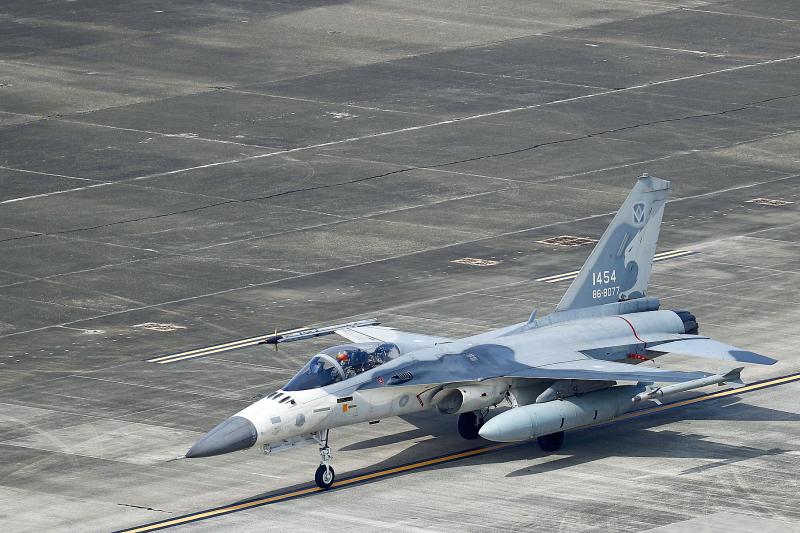The air force yesterday conducted a rare public drill, loading locally made cruise missiles that reportedly can reach coastal Chinese provinces, amid an increase in military threats from Beijing.
Flight personnel from the First Tactical Fighter Wing loaded an Indigenous Defense Fighter (IDF) jet with Wan Chien air-to-ground cruise missiles at Tainan Air Base.
The missile, developed by the military’s top research unit, the Chungshan Institute of Science and Technology, is said to be able to hit Chinese airports and military units in China’s Fujian and Guangdong provinces if fired from Taiwanese fighter jets from near the median line of the Taiwan Strait.

Photo: Ritchie B. Tongo, EPA-EFE
However, Colonel Lee Ching-shi (李慶熙), head of political warfare for the First Tactical Fighter Wing, declined to comment on the missiles’ range or whether air force fighters have already been armed with them on routine patrols.
The drill, which was open to the press, was part of the pre-Lunar New Year holiday drill that the military holds annually to show the public that the armed forces are combat-ready at all times.
An emergency takeoff drill was also held at the base to simulate a Chinese air invasion. It took only about five minutes for an IDF to take off after its pilot heard the scramble alarm.
The drill was held after 29 Chinese People’s Liberation Army (PLA) military aircraft crossed into Taiwan’s air defense identification zone (ADIZ) in the past three days.
Four PLA aircraft yesterday entered Taiwan’s ADIZ, according to the Ministry of National Defense’s Web site.
That marks the 22nd day this month that China has sent aircraft into the nation’s ADIZ.
Asked to comment on the high frequency of Chinese intrusions, Lee said that the air force is under tremendous pressure, but would always be ready for combat to safeguard the nation’s airspace.
Lee said that the Taichung-based Third Tactical Fighter Wing has deployed another squadron of IDF jets at Magong Airport in outlying Penghu County, so that it would be able to respond immediately to any Chinese activity.

POSITIVE DEVELOPMENT: Japan and the US are expected to hold in-depth discussions on Taiwan-related issues during the meeting next month, Japanese sources said The holding of a Japan-US leaders’ meeting ahead of US President Donald Trump’s visit to China is positive news for Taiwan, former Japan-Taiwan Exchange Association representative Hiroyasu Izumi said yesterday. After the Liberal Democratic Party’s landslide victory in Japan’s House of Representatives election, Japanese Prime Minister Sanae Takaichi is scheduled to visit the US next month, where she is to meet with Trump ahead of the US president’s planned visit to China from March 31 to April 2 for a meeting with Chinese President Xi Jinping (習近平). Japan and the US are expected to hold in-depth discussions on Taiwan-related issues during the

‘LIKE-MINDED PARTNER’: Tako van Popta said it would be inappropriate to delay signing the deal with Taiwan because of China, adding he would promote the issue Canadian senators have stressed Taiwan’s importance for international trade and expressed enthusiasm for ensuring the Taiwan-Canada trade cooperation framework agreement is implemented this year. Representative to Canada Harry Tseng (曾厚仁) in an interview with the Central News Agency (CNA) said he was increasingly uneasy about Ottawa’s delays in signing the agreement, especially as Ottawa has warmed toward Beijing. There are “no negotiations left. Not only [is it] initialed, we have three versions of the text ready: English, French and Mandarin,” Tseng said. “That tells you how close we are to the final signature.” Tseng said that he hoped Canadian Prime Minister Mark Carney

President William Lai (賴清德) yesterday bestowed one of Taiwan’s highest honors on Saint Vincent and the Grenadines (SVG) Ambassador Andrea Clare Bowman in recognition of her contributions to bilateral ties. “By conferring the Order of Brilliant Star with Grand Cordon on Ambassador Bowman today, I want to sincerely thank her, on behalf of the Taiwanese people, for her outstanding contribution to deepening diplomatic ties between Taiwan and SVG,” Lai said at a ceremony held at the Presidential Office in Taipei. He noted that Bowman became SVG’s first ambassador to Taiwan in 2019 and

A man walks past elementary school artworks at the Taipei Lantern Festival in Ximen District yesterday, the first day of the event. The festival is to run from 5pm to 10pm through March 15.